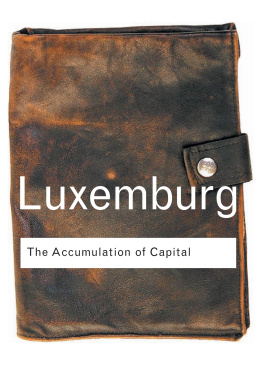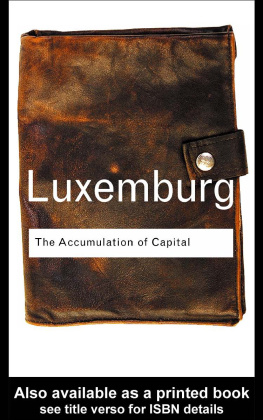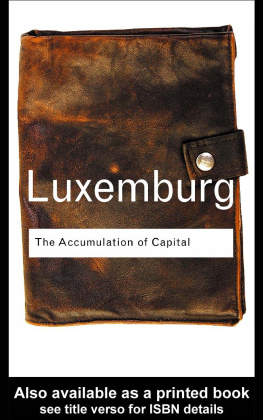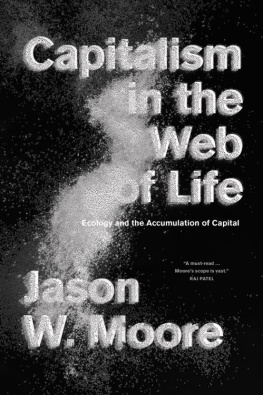Agnes Schwarzschild - The Accumulation of Capital
Here you can read online Agnes Schwarzschild - The Accumulation of Capital full text of the book (entire story) in english for free. Download pdf and epub, get meaning, cover and reviews about this ebook. publisher: Taylor and Francis, genre: Art. Description of the work, (preface) as well as reviews are available. Best literature library LitArk.com created for fans of good reading and offers a wide selection of genres:
Romance novel
Science fiction
Adventure
Detective
Science
History
Home and family
Prose
Art
Politics
Computer
Non-fiction
Religion
Business
Children
Humor
Choose a favorite category and find really read worthwhile books. Enjoy immersion in the world of imagination, feel the emotions of the characters or learn something new for yourself, make an fascinating discovery.
- Book:The Accumulation of Capital
- Author:
- Publisher:Taylor and Francis
- Genre:
- Rating:5 / 5
- Favourites:Add to favourites
- Your mark:
- 100
- 1
- 2
- 3
- 4
- 5
The Accumulation of Capital: summary, description and annotation
We offer to read an annotation, description, summary or preface (depends on what the author of the book "The Accumulation of Capital" wrote himself). If you haven't found the necessary information about the book — write in the comments, we will try to find it.
The Accumulation of Capital — read online for free the complete book (whole text) full work
Below is the text of the book, divided by pages. System saving the place of the last page read, allows you to conveniently read the book "The Accumulation of Capital" online for free, without having to search again every time where you left off. Put a bookmark, and you can go to the page where you finished reading at any time.
Font size:
Interval:
Bookmark:

The Accumulation of Capital is arguably the most important advance on Marxs political economy to date. Written by a working-class revolutionary leader who begins by critically analyzing Marxs draft Volume 2 of Capital and ends by relating to militarism, Luxemburg develops a theoretical foundation for the global drive and structural crisis of capitalism. Although opposed by contemporaries Lenin and Bukharin, her book has passed historical test and can be avoided only at our peril.
Paul Zarembka
The Accumulation of Capital
Translated by Agnes Schwarzschild
With a new introduction by Tadeusz Kowalik

Die Akkumulation des Kapitals first published 1913
English edition first published 1951
by Routledge & Kegan Paul
First published in Routledge Classics 2003
by Routledge
2 Park Square, Milton Park, Abingdon, Oxon, OX14 4RN
711 Third Avenue, New York, NY 10017
Routledge is an imprint of the Taylor & Francis Group
This edition 2003 Routledge Introduction to the Routledge Classics edition 2003 Tadeusz Kowalik
Typeset in Joanna by RefineCatch Limited, Bungay, Suffolk
All rights reserved. No part of this book may be reprinted or reproduced or utilised in any form or by any electronic, mechanical, or other means, now known or hereafter invented, including photocopying and recording, or in any information storage or retrieval system, without permission in writing from the publishers.
British Library Cataloguing in Publication Data
A catalogue record for this book is available from the British Library
Library of Congress Cataloging in Publication Data
A catalog record for this book has been requested
ISBN 9780415304450
Rosa Luxemburg has been known not only (perhaps even not so much) as an economic theoretician, but also as one of the leaders of the German Social Democratic Party and founder of the Social Democratic Party in the Kingdom of Poland. In non-communist socialist circles her political pamphlet criticising the Russian Revolution remains most popular. In the academic milieu the reception of Luxemburgs economic works came rather late as they were written in Marxian (Marxist) language and deeply involved in the controversies amongst the socialists. The first English edition (1951) of her book The Accumulation of Capital was vindicated as one of the pioneering works of the effective demand theory and Joan Robinsons introduction attempted to translate the main message of this PolishGerman economist into the language of Keynesian economics.
Rosa Luxemburg was born in 1870, in Zamo (a part of Polish territory under Russian occupation). She went to university in Zurich, moving from the study of philosophy and natural sciences to economics. Her PhD dissertation, presented there in 1897, was on the industrial development of the Kingdom of Poland ( Die industrielle Entwicklung Polens ). A year later she moved to Germany for good, in order to be active in a leading European socialist party. Her name became widely known not only in Germany, but also within The Socialist International, due to her polemical essays against the revisionism and reformism of Eduard Bernstein, in which she defended revolutionary Marxism (they were published in a book Sozialreform oder Revolution , 1900). Since then these two names have long symbolised the two opposing wings of the socialist movement not only in Germany, but in the whole of continental Europe. Luxemburg was murdered in Berlin during the German revolution in 1919.
The Accumulation of Capital , probably the best book produced by a Marxist and socialist thinker since Karl Marxs opus magnum , emerged from her sudden revelation. Until January 1912 Rosa Luxemburg was an orthodox follower of Marx, believing that political economy had found its crowning achievement in Das Kapital and may be perfected by his followers only in details. In this vein she began writing a textbook for popular consumption, but while struggling with its last chapter on the general tendencies of capitalist development, she suddenly discovered a problem solved neither by Marx nor anybody else. It was clear to her that capitalism is a historical phenomenon, but that the answer to what its future economic limits were had not been found. This was a question she tried to answer.
Her revelation was so strong that she wrote the treatise as if in extasis . As she put it in a letter to her friend: The period in which I wrote the Accumulation belongs to the happiest of my life. I lived in a veritable trance. Day and night I neither saw nor heard anything as that one problem developed so beautifully before my eyes. I dont know which gave me more pleasure: the process of thinking... or the literary creation with pen in hand. Do you know that I wrote the whole 900 pages in 4 months at one sitting? An unheard-of thing! Without checking the rough copy even once, I had it printed.
These rush and Rausch methods had their advantages and disadvantages. From these emotions stem a colourful literary text, which is a pleasure to read, particularly the historical chapters. But as an analytical study, it has flaws, repetitions, and even contradictions. Understandably, such a work has been interpreted in many different ways and it, in fact, provoked most controversy amongst Marxists, although less so within academic circles.
Rosa Luxemburg was enlightened not only by the new unsolved problem, but also by a discovery of an analytical tool for solving it. She starts her analysis by acknowledging Marxs important contribution to political economy by grasping, in one formula, the problem of the reproduction of global social capital. In his famous schemata of reproduction, Marx shows an exchange (proportions) between two aggregate divisions of the national economy: the means of production and consumption products. The usefulness of this tool lies in facilitating a theoretical consideration of the dynamics of the capitalist economy in most general terms, using such aggregate categories, like global capital, wage fund and the total sum of profits for the whole capitalist class. One has to remember that, in the times of Rosa Luxemburg, economics was almost totally caught up in microanalysis. Even such notions as gross domestic product or national income, nowadays regarded as elementary, were as yet unknown.
However, Luxemburg was convinced that Marx had managed to create only a very general, abstract (mathematical) formula, which should be seen as the starting point of analysing the real problems of capitalist economic development as a whole. Moreover, she thought that Marx had made several assumptions in his formula, which prevented him from seeing the real contradictions in the process of capitalist development.
Her analysis, with its polemical digressions, not only criticised these assumptions, but also showed up some contradictions in Marxs reasoning, particularly differences expressed in the second and third volumes of his opus magnum . Her criticism, however, did not transform itself into an elaboration of general schemata, free of the very assumptions she regarded as wrong. She did not succeed in including in her model the pre-capitalist environment or money. But she did manage to articulate, through a dialogue with Marx, some very important and stimulating ideas, both theoretically and through historical analysis.
The most general problem, which was in a way self-evident for Marx but bothered Rosa Luxemburg, was a question: what are the incentives and stimuli for capitalist economic development? Are they intimately connected with a very nature of capitalist entrepreneurs, or dependent on environment? In contemporary terms (introduced by J.M. Keynes and M. Kalecki) the problem was how to explain the process of transformation of savings into real investment. Marx saw the historical limits of capitalism as lying in the tension and class conflict created by rapid economic development, which laid the ground for social revolution. But he explained economic expansion by a constant thirst for profits and the rivalry between individual capitalists for its maximisation (cf. his famous exclamation: Accumulate! Accumulate! That is Moses and the Prophets). According to this view, the transformation of world economies into a global capitalist system was only a matter of time.
Font size:
Interval:
Bookmark:
Similar books «The Accumulation of Capital»
Look at similar books to The Accumulation of Capital. We have selected literature similar in name and meaning in the hope of providing readers with more options to find new, interesting, not yet read works.
Discussion, reviews of the book The Accumulation of Capital and just readers' own opinions. Leave your comments, write what you think about the work, its meaning or the main characters. Specify what exactly you liked and what you didn't like, and why you think so.












